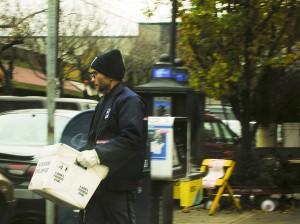
Zervas / Flickr
The U.S. Postal Service is planning a downsizing, which could disproportionately hurt African Americans,
The black middle class has been hit particularly hard by the recession; many of the economic gains earned over 50 years disappeared between 2007 and 2009.
The foreclosure crisis, lack of accumulated wealth and the role of a college education in boosting job prospects have all contributed to the decline of the black middle class. Another big factor: cuts to government jobs. Much of the black middle class was built upon public sector jobs, which for decades allowed African Americans to circumvent discrimination in the private sector.
African Americans are over-represented in government jobs [PDF]. So even as the economy slowly adds jobs, government job losses continue to rack up, disproportionately affecting African Americans. Reducing government has been a hot political topic since 2010, particularly with the surge of the tea party movement, which has been accused of having racist undertones. But NPR points out that 70 percent of government job cuts happened in 12 states, all with Republican-controlled legislative bodies, and suggests that such job cuts have fostered resentment among African Americans. From NPR:







